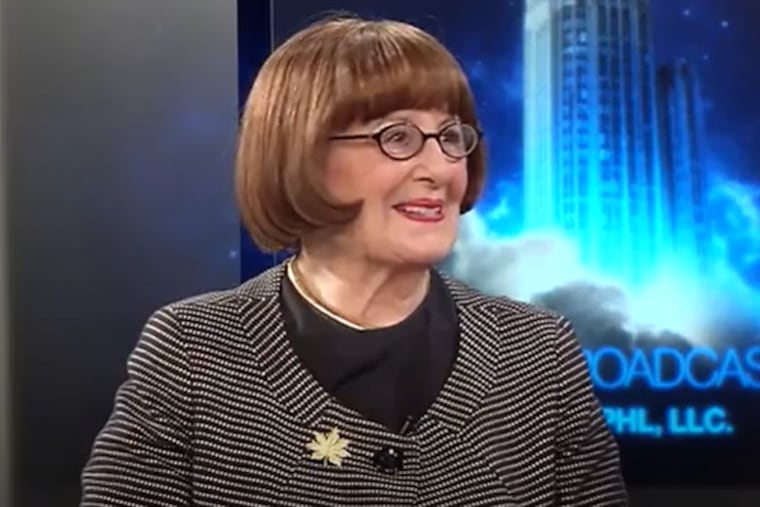Dorie Lenz, pioneering TV broadcaster at Channel 17, has died at 101
She specialized in detailed public service campaigns on hot-button social issues and earned two Emmys in 1988 for her program ‘Caring for the Frail Elderly.’

Dorie Lenz, 101, formerly of Philadelphia, pioneering TV broadcaster, longtime director of public affairs for WPHL-TV (Channel 17), member of the Broadcast Pioneers of Philadelphia Hall of Fame, volunteer, and mentor, died Sunday, Jan. 19, of age-associated ailments at her home in New York.
A graduate of Philadelphia High School For Girls and lifelong community advocate, Ms. Lenz broke into TV as a 10-year-old in a local children’s show and spent 30 years, from 1970 to 2000, as director of public affairs and program host at Channel 17, known now as PHL17. She specialized in detailed public service campaigns on hot-button social issues and earned two Emmys in 1988 for her program Caring for the Frail Elderly.
She also produced How to Get Child Support, Tax Breaks for the Working Poor, Register and Vote, How to Get on TV, Baseball for the Better Half, and other shows about crime, religion, politics, and everyday life in Philadelphia. Her 1981-82 project, The Displaced Homemaker, earned one international award, one national award, and four local awards. Her 1984-85 project, Sexual Harassment on the Job, earned two national awards and two state awards.
She interviewed newsmakers of all kinds on the public affairs programs Delaware Valley Forum, New Jersey Forum, and Community Close Up. Viewers and TV insiders hailed her as a champion and watchdog for the community. She talked to Phillies players before games in the 1970s on her 10-minute Dorie Lenz Show, mentored other journalists for decades, and volunteered as a role model for girls and women everywhere.
Her TV job, she told The Inquirer in 1984, was to inform and educate. “Our intent is to have people know the problem exists, how to prevent it from happening, and, if it already is, what they can do to stop it,” she said. “We have the unique power of the medium to do it.”
Her community-based programming earned honors from American Women in Radio and Television, the Pennsylvania Commission on Women, and a dozen other groups. She was named the 1993 Person of the Year by the Broadcast Pioneers of Philadelphia and inducted into the group’s Hall of Fame in 1999.
She was a 1991 Person of the Year for the Philadelphia Ad Club and told The Inquirer she was “passionate about my work. I’m having a long-term love affair with my job.”
She also created and distributed free information booklets and resource guides related to the topics she covered. She organized panels and seminars, and spoke to community groups about issues of the day. She supported scholarship drives, cohosted charity telethons, and judged local talent shows.
Former colleagues called her “a very impressive and beautiful person inside and out” and a “one-of-a-kind class act” in a Facebook tribute. One former colleague said she “always encouraged feistiness.”
Ms. Lenz started her career as a child performer on WCAU-TV’s Children’s Hour and later did voices for a KYW-AM radio show for children. She got married in the 1940s and volunteered for all kinds of community and civic organizations. But she wanted more, she said.
“If you want it, stick with it. You may not get it all. You may get a little bit of it. But it’s an industry I found wonderful.”
“I decided I wanted television, and I got it,” Ms. Lenz said in a 2015 online interview with Channel 17’s Steve Highsmith. “I was born to work. I really was. I was born to be involved. l was born to care about a cause and do something.”
She returned to TV in the late 1960s after her husband died and spent two years as cohost of Channel 29’s Market Show before joining Channel 17. Later, she served on boards of nonprofits and other groups, and was the former chair and board member emeritus of the Broadcast Pioneers of Philadelphia. “Her efforts for women in broadcasting are not equaled,” a former colleague said in a tribute.
Doris May Gold was born May 27, 1923, in Philadelphia. She spent her teenage years in Center City and told stories of doing her homework in Rittenhouse Square.
She married David M. Lenz, and they had a daughter, Lisa, and lived in Philadelphia and Rydal, Montgomery County.
Her daughter said: “She was brainy, gorgeous, funny as hell with a keen sense of irony and, simply, singular.”
Ms. Lenz attended the University of Pennsylvania for two years. She lived later in Wyncote and Center City before moving recently to New York.
She enjoyed reading British writers and discussing language. She served as a poll worker for years, well into her 90s.
She drove a silver Miata and called herself “a TV addict.” She consulted for a few years after her retirement and wouldn’t reveal her age to The Inquirer in 1991.
“Everybody in the station calls me Mom,” she said. “You figure it out.” Her daughter said: “She was so fierce.”
In addition to her daughter, Ms. Lenz is survived by other relatives. A brother and her husband died earlier.
A celebration of her life is to be held later.
Donations in her name may be made to the Broadcast Pioneers of Philadelphia Scholarship Fund, Box 2886, Bala Cynwyd, Pa. 19004.